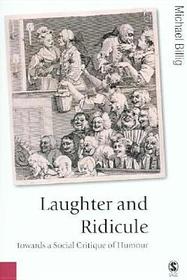
Laughter and Ridicule
Towards a Social Critique of Humour
Series: Published in association with Theory, Culture & Society;
- Publisher's listprice GBP 59.00
-
28 187 Ft (26 845 Ft + 5% VAT)
The price is estimated because at the time of ordering we do not know what conversion rates will apply to HUF / product currency when the book arrives. In case HUF is weaker, the price increases slightly, in case HUF is stronger, the price goes lower slightly.
- Discount 20% (cc. 5 637 Ft off)
- Discounted price 22 550 Ft (21 476 Ft + 5% VAT)
- Discount is valid until: 31 December 2025
Subcribe now and take benefit of a favourable price.
Subscribe
28 187 Ft

Availability
printed on demand
Why don't you give exact delivery time?
Delivery time is estimated on our previous experiences. We give estimations only, because we order from outside Hungary, and the delivery time mainly depends on how quickly the publisher supplies the book. Faster or slower deliveries both happen, but we do our best to supply as quickly as possible.
Product details:
- Edition number First Edition
- Publisher SAGE Publications Ltd
- Date of Publication 21 July 2005
- ISBN 9781412911436
- Binding Paperback
- No. of pages272 pages
- Size 234x156 mm
- Language English 0
Categories
Short description:
This delightful, thought-provoking book tackles head-on the assumption that laughter and humour are necessarily good in themselves. The author proposes a social theory that places humour central to social life. Billig argues that all cultures use ridicule as a disciplinary means to uphold norms of conduct and conventions of meaning.
More
Long description:
`From Thomas Hobbes' fear of the power of laughter to the compulsory, packaged "fun" of the contemporary mass media, Billig takes the reader on a stimulating tour of the strange world of humour. Both a significant work of scholarship and a novel contribution to the understanding of the humourous, this is a seriously engaging book' - David Inglis, University of Aberdeen
This delightful book tackles the prevailing assumption that laughter and humour are inherently good. In developing a critique of humour the author proposes a social theory that places humour - in the form of ridicule - as central to social life. Billig argues that all cultures use ridicule as a disciplinary means to uphold norms of conduct and conventions of meaning.
Historically, theories of humour reflect wider visions of politics, morality and aesthetics. For example, Bergson argued that humour contains an element of cruelty while Freud suggested that we deceive ourselves about the true nature of our laughter. Billig discusses these and other theories, while using the topic of humour to throw light on the perennial social problems of regulation, control and emancipation.
MoreTable of Contents:
Introduction
A Critique of Positive Humour
PART ONE: HISTORICAL ASPECTS
Superiority Theories
Hobbes and other Misogelasts
Incongruity Theories and Gentlemanly Laughter
Victorian Relief Theory
Bergson and the Function of Humour
Freud and the Hidden Secrets of Jokes
PART TWO: THEORETICAL ASPECTS
Laughter and Unlaughter
Embarrassment, Humour and the Social Order
Final Remarks











